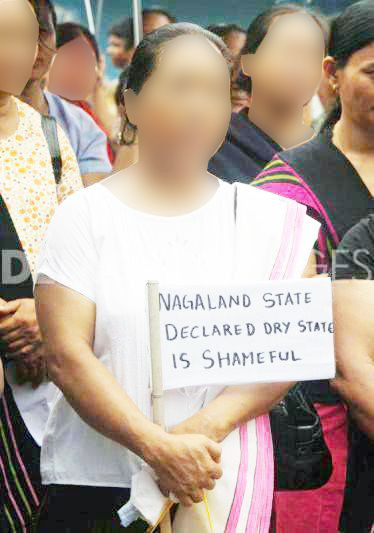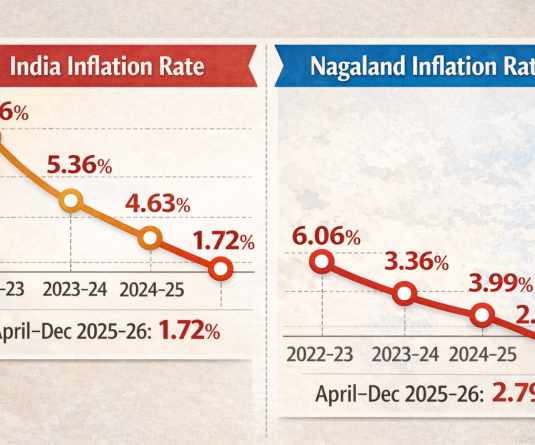There is a continuous debate on various platforms over the total failure of the Nagaland Liquor Total Prohibition (NLTP) Act 1989 and why it should be lifted or revised. (File Photo | For representational purpose only)

The debate on Prohibition in Nagaland
Atono Tsükrü Kense
Kohima | October 15
The movement to fight the sale and flow of liquor into the state, which led to the adoption of the Nagaland Liquor Total Prohibition (NLTP) Act 1989, was spearheaded by the Nagaland Baptist Church Council (NBCC) with strong support of the Naga Mothers Association (NMA).
During the 80s when substance abuse and alcoholism was at its peak destroying families and young people, and the situation reached an ‘epidemic’ proportion, Sano Vamuzo, former president of NMA said that the NLTP Act was enacted “with good intention to save the society.”
This is an issue that concerns every individual, not only the mothers as it was and is, destroying the homes, health and lives of the people, she added.
Although this was done with good intention, there is a continuous debate on various platforms over the total failure of the prohibition and why it should be lifted and sale of alcohol legalised.
In the previous two series, The Morung Express has highlighted the lucrative IMFL trade in the state and the health concerns on consumption of spurious and adulterated liquor. In this series, various personalities from different walks of life have expressed their views on whether the implementation of Prohibition Act should be lifted or revised.
Time for govt to take a strong stand
With the Act not being implemented in toto, rather encouraging thriving business, MLA, Kuzholuzo Nienu opined that the government needs to wake up and take a strong stand to either legalise it or strictly enforce it.
Time has come for the government to act on its own said Nienu adding that it has become a health hazard due to consumption of adulterated liquor. When it affects the health, we are draining the economy as well as losing lots of precious lives, he added.
While strongly advocating for the strict implementation of the Act, Minister for PWD, Tongpang Ozukum however remarked, “If we cannot implement in toto, there is no point keeping the Act at all.”
“I know our state is losing crores of rupees but it is not only about revenue, but how judiciously and religiously we can implement the Act. If we are unable to implement, better to revoke, lift the ban and legalise and let the state also get revenue,” Ozukum commented.
Ozukum also observed those dealing in this syndicate business are hiding from the police, people and from the law, and that “They take lots of undue advantage of those who consume alcohol.”
Medical point of view
Expressing concerns on the effects of spurious and adulterated liquor on the people’s health, a senior physician emphasised on the need to lift the ban on NLTP Act.
Losing of state revenue is secondary, but we have to realise the consequences of spurious liquor on the health and lives of the people he stated, rationalising his point of view.
Speaking in favour of the ban to be lifted, he also added that the sale should be strictly regulated with issuance of licences.
Another doctor also called for lifting of the ban adding that, “Rather than doing good, it is doing more damage both on the health and economy of the people.”
Call for open forum discussions
A professor of Nagaland University and a social activist, Rosemary Dzüvichü also said “when the government had discussions, they never called the Church.”
“Naga Mothers’ Association (NMA) has been repeatedly saying that the NBCC must be brought into any kind of open forum. Any government that is there has to make its own policy, if it feels it is important let them make their own policy,” she strongly stated. Dzüvichü is also an Advisor to the NMA.
“We are all aware of the adulterations and the side effects of alcoholism. But just because the Act is lifted, alcoholism is not going to go down,” observed Dzüvichü who opined, “We do have reversal affects also every time we take a step, but my stand is let the church come on an open debate with the civil society and the young people to deliberate on the issue and let the government make its policy.”
‘Silence means consent’
Advocating that the Act should be implemented, social activist Sano Vamuzo said, “Implementation is weak as there is no leader who can tighten the screw of this Act. This Act is not going anywhere as everyone is expecting the other to do something about it. It all depends on the leaders.”
“We know this Act is good and will do good for our people, but when people fail to reason, we are hindering ourselves. We are fickle and inconsistent, because even knowing the advantage of the Act, people are silent. Silence means consent,” Vamuzo asserted.
While agreeing that the review of the Act is long overdue, she also reasoned that it is only through deliberations and consultations that something can be arrived at.
“As mothers, even if people agree to lift or legalise the Act, we are not party to that. We will stand with what is wrong and doing. We know what is right and we will keep on stressing on what is right,” she said. However, she also acknowledged that a compromise may have to be made, considering the larger voice towards legalising it.
Church never invited for consultation
A Baptist Church leader opined that although the Act is a lofty one which empowers the government, not much has been implemented. “It is only viewed as illegal and nothing has gone beyond that. Loopholes were observed and seen but never studied to be corrected,” he noted with disappointment.
When talks and debates arise on this contentious issue, the Church is being blamed. However, it was informed that the government has never called or invited the Church for any consultation on this issue.
“We are a church and we cannot come out publicly and declare the Act to be lifted. We need consultations,” he maintained.
When asked if considering the pros and cons of the Act, the Church would still be adamant on the implementation of the Act, he replied, “I do not think so; the Church will surely want to hear positive criticism where a reasonable conversation can take place.”
Justifying his views, he maintained that the Act is in need of revisitation with a wider and an open consultation perhaps, and “When this is initiated, I am sure positive change and reinforcement can evolve. I do not think losing state revenue is a good reason. No revenue is properly utilised. Public revenue sectors are all dying a natural death,” he added.
This is the last of a three-part series.





